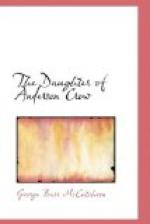“That’s jest the point. She’s lived in New York an’ she’s got used to it. She’s got fine idees; even her clothes seem to fit different. Now, do you s’pose that fine-lookin’ girl with all her New York trimmin’s ’s goin’ to hang ‘round a fool little town like this? Not much! She’s goin’ to dig out o’ here as soon’s she gits a chance; an’ she’s goin’ to live right where her heart tells her she belongs—in the metropolees of New York. She don’t belong in no jim-crow town like this. Doggone, Eva, I hate to see ’er go!”
There was such a wail of bitterness in the old constable’s remark that Mrs. Crow felt the tears start to her own eyes. It was the girl they both wanted, after all—not the money. Rosalie, coming home with her party some time afterward, found the old couple still seated on the porch. The young people could not conceal their surprise.
“Counting the stars, pop?” asked Edna Crow.
“He’s waiting for the eclipse,” bawled noisy Ed Higgins, the grocer’s clerk. “It’s due next winter. H’are you, Anderson?”
“How’s that?” was Anderson’s rebuke.
“I mean Mr. Crow,” corrected Ed, with a nervous glance at Rosalie, who had been his companion for the evening.
“Oh, I’m jest so-so,” remarked Anderson, mollified. “How was the party?”
“It wasn’t a party, Daddy Crow,” laughed Rosalie, seating herself in front of him on the porch rail. “It was an experience meeting. Alf Reesling has reformed again. He told us all about his last attack of delirium tremens.”
“You don’t say so! Well, sir, I never thought Alf could find the time to reform ag’in. He’s too busy gittin’ tight,” mused Anderson. “But I guess reformin’ c’n git to be as much a habit as anythin’ else.”
“I think he was a little woozy to-night,” ventured ’Rast Little.
“A little what?”
“Drunk,” explained ’Rast, without wasting words. ’Rast had acquired the synonym at the business men’s carnival in Boggs City the preceding fall. Sometimes he substituted the words “pie-eyed,” “skeed,” “lit up,” etc., just to show his worldliness.
After the young men had departed and the Crow girls had gone upstairs with their mother Rosalie slipped out on the porch and sat herself down upon the knee of her disconsolate guardian.
“You are worried about something, Daddy Crow,” she said gently. “Now, speak up, sir. What is it?”
“It’s time you were in bed,” scolded Anderson, pulling his whiskers nervously.
“Oh, I’m young, daddy. I don’t need sleep. But you never have been up as late as this since I’ve known you.”
“I was up later’n this the time you had the whoopin’-cough, all right.”
“What’s troubling you, daddy?”
“Oh, nothin’—nothin’ at all. Doggone, cain’t a man set out on his own porch ’thout—”
“Forgive me, daddy. Shall I go away and leave you?”
“Gosh a’mighty, no!” he gasped. “That’s what’s worryin’ me—oh, you didn’t mean forever. You jest meant to-night? Geminy crickets, you did give me a skeer!” He sank back with a great sigh of relief.




